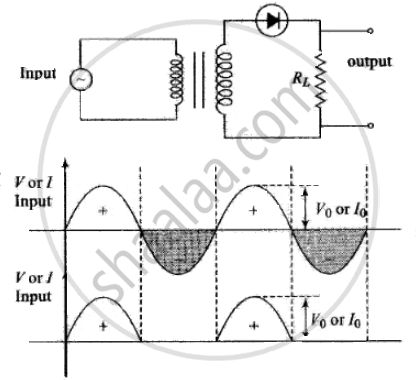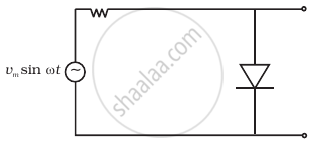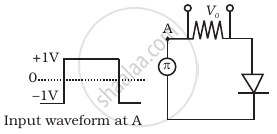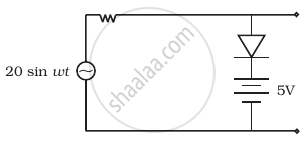Advertisements
Advertisements
Question
A 220 V A.C. supply is connected between points A and B (figure). What will be the potential difference V across the capacitor?

Options
220 V
110 V
O V
`220 sqrt(2)` V
Solution
`220 sqrt(2)` V
Explanation:
Half wave rectifier: When the P-N junction diode rectifies half of the ac wave, it is called a half-wave rectifier.

(i) During positive half cycle,
Diode → forward biased
Output signal → obtained
(ii) During the negative half cycle,
Diode → reverse biased
Output signal → not obtained
(iii) Output voltage is obtained across the load resistance RL. It is not constant but pulsating (mixture of ac and dc) in nature.
(iv) Average output in one cycle
`I_(dc) = I_0/pi` and `V_(dc) = V_0/pi, I_0 = V_0/(r_f + R_L)` .....(`r_f` = forward based resistance)
(v) r.m.s. output: `I_(rms) = I_0/2, V_(rms) = V_0/2`
As p-n junction diode will conduct during the positive half cycle only, during negative half cycle diode is reverse biased. During this diode will not give any output. So, the potential difference across capacitor C = peak voltage of the given AC voltage = `V_0 = V_(rms) sqrt(2) = 220 sqrt(2) V`
APPEARS IN
RELATED QUESTIONS
Draw the circuit diagram of a full wave rectifier. Explain its working showing its input and output waveforms.
Briefly explain how the output voltage/current is unidirectional.
Fill in the blank.
The ability of a junction diode to __________ an alternating voltage is based on the fact that it allows current to pass only when it is forward biased.
Explain with a proper diagram how an ac signal can be converted into dc (pulsating) signal with output frequency as double than the input frequency using pn junction diode. Give its input and output waveforms.
The output of the given circuit in figure is given below.

To reduce the ripples in a rectifier circuit with capacitor filter ______.
- RL should be increased.
- input frequency should be decreased.
- input frequency should be increased.
- capacitors with high capacitance should be used.
Draw the output waveform across the resistor (Figure).
Assuming the ideal diode, draw the output waveform for the circuit given in figure. Explain the waveform.

Give two differences between a half-wave rectifier and a full-wave rectifier.
With the help of a circuit diagram, explain how a full wave rectifier gives output rectified voltage corresponding to both halves of the input ac voltage.
